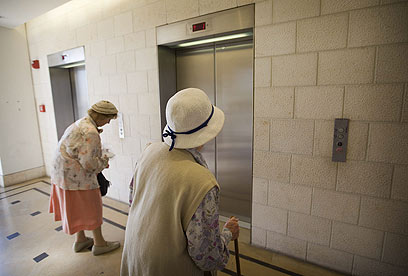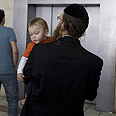The Jewish day of rest has become a bit more labor-intensive for Yosef Ball.
"It's been very hard, but we're walking up the stairs slowly and with a lot of patience," said Ball, 29, pushing a baby carriage with two toddlers in tow on a recent day.
The Orthodox Jew and his wife are no longer using elevators custom-built for the Jewish Sabbath, ever since a rabbinical ruling last month outlawed them. Instead, they have been hiking up seven flights of stairs to get home each Saturday, lugging with them their five young children and a double stroller.
Rabbi Said
Kobi Nahshoni
Senior haredi halachic arbiters make new ruling against using designated elevators for Shabbat, saying 'direct exertion is created related to doing work according to the Bible' and that 'it is related to a grave prohibition against actual desecration of the Sabbath.' Head of Tzomet Institute for Halacha and Technology: I'm glad public doesn't buy unexplained religious injunctions
Jewish law, or Halacha, forbids the use of electrical items on Shabbat. But for decades rabbis have allowed special elevators that automatically stop at every floor without the riders pushing any buttons, permitting Orthodox Jews to ride them and live in high-rise buildings.
The ruling last month by one of Israel's leading rabbis, calling the elevators a no-go, has reignited a vigorous debate over the lifts, forcing Orthodox Jews living on top floors to decide if they're up for the steep hike home from synagogue on Saturdays.
The Orthodox community has long been divided over the elevators. Opponents say that the riders push no button, the weight of the passengers still increases the amount of electricity required to power the lift, thus violating Jewish law.
Still, the elevators, in use for some four decades, have opened the door for large numbers of Orthodox Jews to dwell in modern skyscrapers.
"No young couple is going to move into a ninth or tenth floor building if it becomes a prison for them," said Jonathan Rosenblum, an ultra-Orthodox commentator in Jerusalem.

Waiting for 'kosher elevator' (Photo: AP)
Lila Lowell, a Bronx native now living in Jerusalem, installed a Shabbat elevator to access her second-floor apartment and won't stop using it despite the decree.
"My elevator is kosher," she said. And she added, "My husband and I have difficulty with the stairs, so we need the elevator." Her young grandchildren also use the lift.
The ruling, decreed last month, is the latest in a series by Israeli rabbis on the minutiae of applying Jewish law to daily life. Top rabbis can count tens of thousands of followers who abide by their rulings.
Nose-picking allowed on Shabbat
Rabbi Yosef Shalom Elyashiv, the revered 99-year-old scholar who signed the elevator ruling, has been behind other controversial decisions before. In September, he proclaimed Jews could not wear Crocs shoes on Yom Kippur, the Day of Atonement, because they were deemed too comfortable for the somber fasting holiday.In 2004, Elyashiv prohibited religious women from wearing Indian-made wigs because the hair may have been used in idol-worshipping ceremonies, which are forbidden under Jewish law. Religious women cover their heads with wigs or cloth as a sign of modesty.
A debate a decade ago by another leading rabbi concluded that nose-picking was allowed on Shabbat. It was under discussion because nose hairs may be plucked out in the process, and cutting hair on Shabbat is outlawed.
The elevators are just one of several electric devices that rabbis have found loopholes for, allowing their use. Religious families can use timers for their lights and special hot plates to warm food as long as those hot plates were not switched on or off during Shabbat.
Hospitals and hotels catering to Orthodox Jews have also had to weigh how to address the elevator decree. The plush David Citadel Hotel in Jerusalem said it will leave it up to visitors to decide whether to use one of the four Shabbat elevators, but expects religious guests to request rooms on the lower of its 10 floors.
Jerusalem's 10-floor Shaare Zedek hospital said it has not received any directive on the matter and will continue operating its Shabbat elevators as usual.
Proponents of the lifts say followers need not change their habits.
"I think people understand nothing has changed technologically," said Rabbi Israel Rozen, head of the Zomet Institute, which specializes in Shabbat-appropriate electrical equipment. He supports the use of Shabbat elevators.
"But if people decide they want to climb 10 floors because of this, that's their choice."

Orthodox Jewish family waits for an elevator. Ruling calls lifts a no-go
Photo: AP
מומלצים















